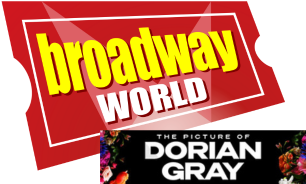Interview: Jesse Luttrell of JESSE LUTTRELL AT THE TRIAD THEATRE February 25th
The big-voiced showman brings a new show to the Triad for his 40th Birthday
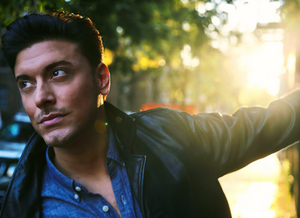
Jesse Luttrell is not your average run-of-the-mill boy singer. He's a natural showman. There's a definite spark to everything Jesse does. Everything is bigger, showier, and more theatrical. He makes it look effortless. He's got a big voice and an undeniable magnetism, and he instinctively knows what an audience will respond to. Now, he's putting the sexy back in cabaret with his new show: Jesse Luttrell at the Triad Theatre. I sat down with Jesse to talk about his new show, his background, and performing this new show as a celebration of his 40th birthday.
This article has been edited for length and content.
How did you begin your life and career as an entertainer?
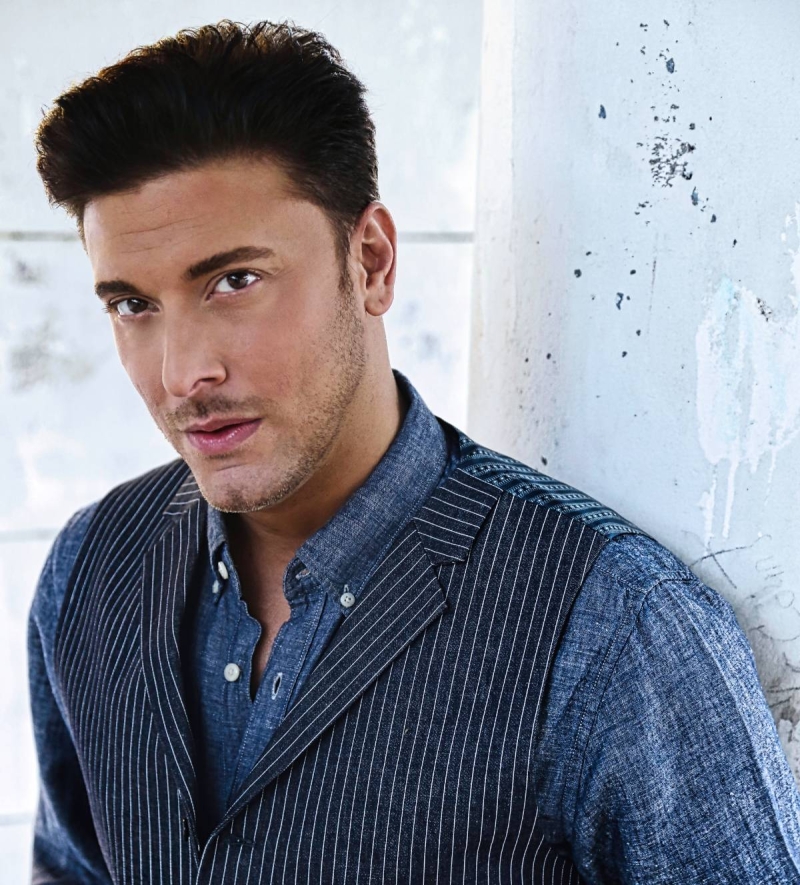 I grew up in rural Pennsylvania in the '90s. I was a dancer. I was a boy soprano in the church choir and I was VERY loud. Louder than the other kids, and the choir director said to my parents: " Your son is a natural talent. How would you like it if I gave him lessons?" So, I began taking voice lessons. He was training me to be competitive and audition for the American Boys Choir. That's what got me started singing.
I grew up in rural Pennsylvania in the '90s. I was a dancer. I was a boy soprano in the church choir and I was VERY loud. Louder than the other kids, and the choir director said to my parents: " Your son is a natural talent. How would you like it if I gave him lessons?" So, I began taking voice lessons. He was training me to be competitive and audition for the American Boys Choir. That's what got me started singing.
I started singing along with my grandmother's records. She had all these records of Dean Martin, Streisand, Garland, - All of the American Songbook people. I also include Tom Jones and the pop stars of the '60s and '70s. I started singing along with those and, since I was really into the records, I used to take quarters from my mom's cookie jar, go to the thrift store down the street and buy whatever records grabbed my interest, and that's how I learned about musical theatre and the golden age of musicals. It would, literally, be the picture on the cover of the record that made me buy it. That led me to getting cast albums and singing like the people on the albums. I know a lot of people who are impressionists who did the same thing - buy the records and perfect their impressions.
When my voice changed, I became this dramatic baritone. I was singing along with Phantom, Miss Saigon, and Les Miz. These were the shows that were happening when I was a teenager. So, this hearty baritone sound developed. I really didn't take any voice lessons after my voice changed. I learned by mimicking other singers; then I ended up going to a performing arts college and I got some voice lessons, but I left after a year and made my way to the city. I began taking lessons again about 5 years ago. I started having vocal trouble, so I went to a guy who helped me. And my voice got 10 times bigger and I learned how to harness it more and give it more dynamics. There was a huge gap in my singing training - I went from boy soprano to no training until basically 5 years ago.
How would you describe your voice? I know a lot of people have done it for you, but how would you describe it?
I have hearing problems, so I can't hear just how loud I am. When I experience my singing voice, it doesn't sound loud enough. The way other people describe it is "paint peeling off the walls loud." My voice teacher told me I was a Heldentenor. It's a rare voice type - basically a tenor who sounds like a baritone. Sort of like what you'd hear in Wagner. I don't sing opera - I do have the classical background from being a boy soprano and the breath support. Opera singers usually are not into musical theatre whatsoever, but they seem to like me. I think it's funny that they do because I have the least amount of classical training of anybody. I'm singing Tom Jones - not the Ring Cycle.
This show is a bit of a homecoming for you. The Triad was where you had your long-running BAWDY cabaret variety show.
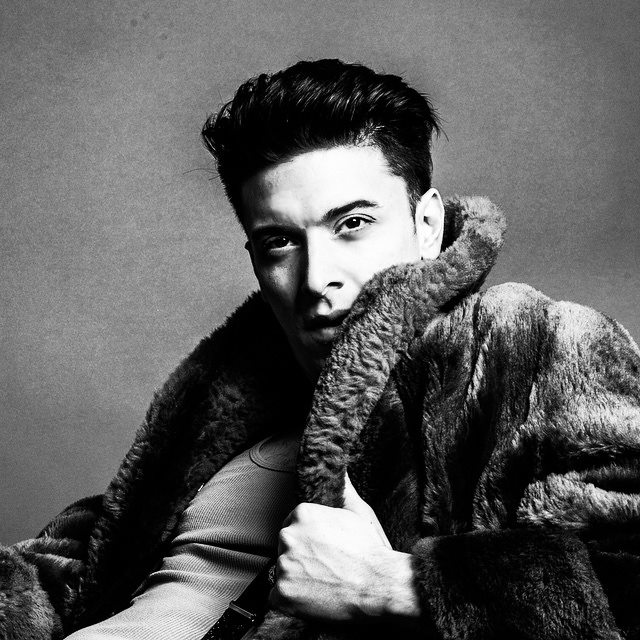 Yes, it's been 10 years since we did BAWDY. We ran for 6 years. I haven't done any shows in the city for 3 or 4 years. I mean, I've made guest appearances in other people's shows, but I haven't done my thing since I did 54 Below. It's a totally new thing. People knew me from the piano bars. They saw me singing drunk at a piano in a basement, so they got that impression. They thought that's what I am. Years later, people don't know what I am now, because I haven't been out, singing around town. This show is a completely different side of me.
Yes, it's been 10 years since we did BAWDY. We ran for 6 years. I haven't done any shows in the city for 3 or 4 years. I mean, I've made guest appearances in other people's shows, but I haven't done my thing since I did 54 Below. It's a totally new thing. People knew me from the piano bars. They saw me singing drunk at a piano in a basement, so they got that impression. They thought that's what I am. Years later, people don't know what I am now, because I haven't been out, singing around town. This show is a completely different side of me.
So, let's talk about the show: This show is taking place on your 40th birthday. Is that what the show is or is it based on something else?
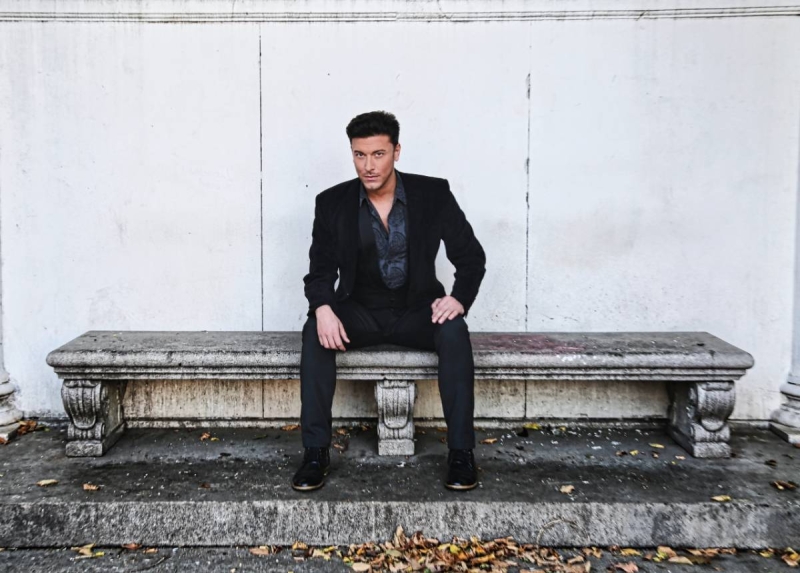 It's my new nightclub act. I don't like using themes. I mean, there is an underlying theme to this show, but I never share it because I want it to be individually and personally entertaining for each person in the audience. I don't want them coming in expecting a story or a theme. I don't even do tribute shows. There IS a lot of 70's music in this show for some reason - Tom Jones, late Elvis stuff, and some Broadway as well, it's very eclectic. It's definitely a mix of stuff. There is an underlying message, and people will go home with it, but I'm not revealing what it is. That's how I feel when I go to a great concert with a great singer. You can, for example, see Barbra Streisand. It's a very career-centered concert but you leave with a message. Everyone leaves with a different present that they got from her. I think that's important. I think the only way to do that successfully is to do it subliminally. Instead of beating an audience over the head with a theme or a message, it's there, and it's the subtext of the evening for the performer. The audience takes what they want, what they need from the show.
It's my new nightclub act. I don't like using themes. I mean, there is an underlying theme to this show, but I never share it because I want it to be individually and personally entertaining for each person in the audience. I don't want them coming in expecting a story or a theme. I don't even do tribute shows. There IS a lot of 70's music in this show for some reason - Tom Jones, late Elvis stuff, and some Broadway as well, it's very eclectic. It's definitely a mix of stuff. There is an underlying message, and people will go home with it, but I'm not revealing what it is. That's how I feel when I go to a great concert with a great singer. You can, for example, see Barbra Streisand. It's a very career-centered concert but you leave with a message. Everyone leaves with a different present that they got from her. I think that's important. I think the only way to do that successfully is to do it subliminally. Instead of beating an audience over the head with a theme or a message, it's there, and it's the subtext of the evening for the performer. The audience takes what they want, what they need from the show.
You don't often hear voices like yours in smaller cabaret rooms.
My voice is big for a small room. I'll never hold back because that would be inauthentic for me. I've learned how to focus it so it doesn't sound aggressive. It's an aggressive voice. My intention was never to play smaller rooms. I've always wanted to do a concert act, a nightclub act. The goal was to play big rooms. I've played big rooms in Florida. I mean, you do a show here for 80, maybe 100 people, and then you go to Florida and you're playing for 1200 people. The goal is to play the big rooms. It's harder to do, especially because you're only one person, and you're not a name. Secondly, you actually get paid in those larger rooms. You don't really make money in New York. This is where we develop our work, we workshop it here and take it to those larger rooms.
Is this show a laboratory for you to take it elsewhere?
I would like to take it elsewhere. I will say that the New York audience isn't going to get a workshop performance. I'll give 120%. It is the first time I'm doing it, and we're going to film it and go balls-to-the-wall to shop it out of town. I've always wanted to do this professionally - not an ego thing or an acting exercise in New York City where I do a solo act and talk about myself. I've always wanted to get paid and do my show on the road. That's always my goal when I do a show.
So, you're turning 40. You decided to do a show on your birthday. Is there any significance to that?
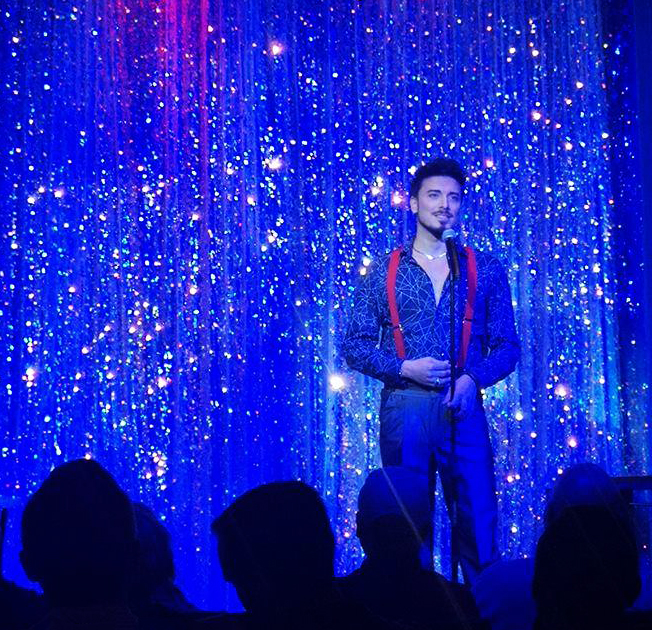 Kind of. I said, when I started doing "book" shows again, a few years ago, and started playing roles again, I wasn't sure I could go back to New York and do a solo act again. It costs a lot of money, I wasn't sure if my following would still be around after so many years. Then it hit me that I was turning 40 - and I won't give away my opening number - I heard this song playing (and it's not a song anyone would ever imagine me singing.) We've all been through a lot of shit in the past two years with the pandemic, relationships, and whatnot. I said, "Oh my God, what the hell have I been through?" Anyway, this song started playing and as soon as I heard it I said to myself, "I have to do a show." I don't want to give it away, but this song came up while I was streaming a radio station. With the mindset I was in, that song needed to happen at that moment. That is my opening number. I thought: "I need to do this. This is a show, and I'm going to do it on my birthday."
Kind of. I said, when I started doing "book" shows again, a few years ago, and started playing roles again, I wasn't sure I could go back to New York and do a solo act again. It costs a lot of money, I wasn't sure if my following would still be around after so many years. Then it hit me that I was turning 40 - and I won't give away my opening number - I heard this song playing (and it's not a song anyone would ever imagine me singing.) We've all been through a lot of shit in the past two years with the pandemic, relationships, and whatnot. I said, "Oh my God, what the hell have I been through?" Anyway, this song started playing and as soon as I heard it I said to myself, "I have to do a show." I don't want to give it away, but this song came up while I was streaming a radio station. With the mindset I was in, that song needed to happen at that moment. That is my opening number. I thought: "I need to do this. This is a show, and I'm going to do it on my birthday."
A few years ago, you went back onstage in full musical book shows. It seems you've made a cottage industry for yourself by playing Gaston in Beauty and the Beast.
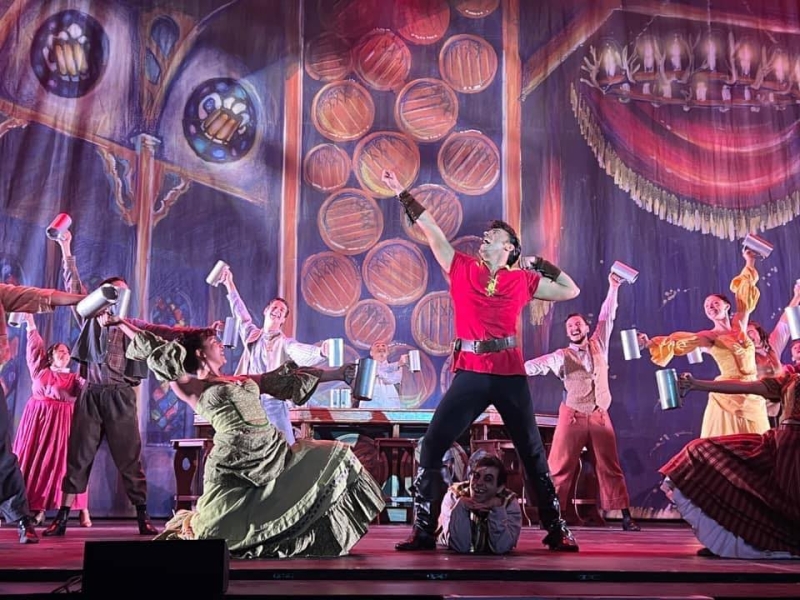 Yeah. Everybody has their "thing." Sometimes, a track in a show just clicks with you. It's not as if people call me to do it. I actively look for the auditions because I love doing the role. I love the kids and the way they react to Gaston. It's so much fun to do because I get to dance, which I haven't done in a long time, and I get to sing in my REAL singing voice. I get to be legit and funny. I get to be this stereotypical masculine archetype - the kind of guys who used to beat the shit out of me in high school. It's sort of taking back my power. I can do it better than they did. They were all really dumb. Those guys are all very frustrated. They aren't emotionally intelligent enough so they use physical aggression and that's how I play Gaston. He's not smart. He can't read. All of the physical aggression comes from that frustration.
Yeah. Everybody has their "thing." Sometimes, a track in a show just clicks with you. It's not as if people call me to do it. I actively look for the auditions because I love doing the role. I love the kids and the way they react to Gaston. It's so much fun to do because I get to dance, which I haven't done in a long time, and I get to sing in my REAL singing voice. I get to be legit and funny. I get to be this stereotypical masculine archetype - the kind of guys who used to beat the shit out of me in high school. It's sort of taking back my power. I can do it better than they did. They were all really dumb. Those guys are all very frustrated. They aren't emotionally intelligent enough so they use physical aggression and that's how I play Gaston. He's not smart. He can't read. All of the physical aggression comes from that frustration.
For this show, you're working with your longtime Musical Director Fred Barton, and James Beaman as your show director. Tell me a little about working with them and what they are bringing to your show.
I've known Fred for over 15 years. He met me at Marie's (Marie's Crisis) I was there, at the end of the night, sitting on the piano singing "Swanee" at the top of my lungs. He came up to me and said "That was really good!" We started chatting, and discussed doing an album and then we began doing shows with his big broadway band at the Metropolitan Room and ended up at Pace University with Tony Award winners and dancers and so on in a series of concerts.
Fred and I are on the same wavelength about what we want, and what we think the audience wants. We're always on the side of the audience- not the side of the industry or the politics of the industry. Our standards align with the audience. There aren't a lot of people in my audience you typically don't see at a cabaret show, which I love. I like that I can find a way that I can make it accessible to audiences and entertaining. A lot of this music isn't being sung anymore, especially the older stuff like Jule Styne. They NEED to be heard because they're so great and because they're universal.
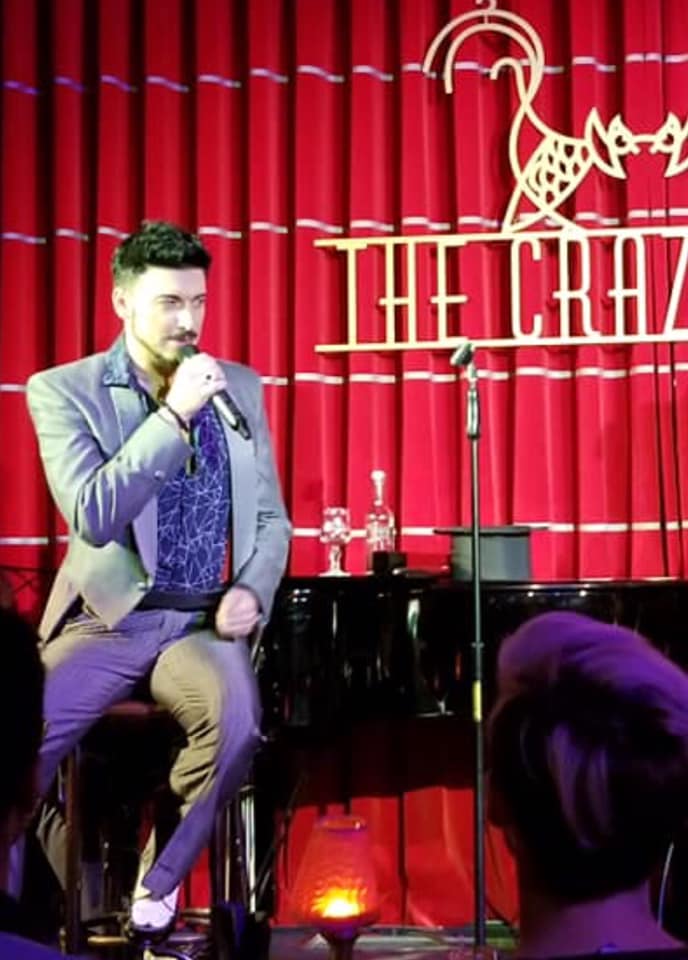 It's good to make it accessible. Cabaret doesn't have to be for the elite. If you listen to those lyrics, especially Jerry Herman and Fred Ebb. They take the most complex ideas and distill them into the most accessible way. Even with the newer pop stuff I do, I look for the universality in the song. It gives a performer a lot more to work with. You can take any of these songs, out of context of the show, out of the character, and make it about your own life, or someone else's life, change the mood. You can play with these songs and change them. You can take a song that people might think is overdone and change it into something entirely new because of the choices you make.
It's good to make it accessible. Cabaret doesn't have to be for the elite. If you listen to those lyrics, especially Jerry Herman and Fred Ebb. They take the most complex ideas and distill them into the most accessible way. Even with the newer pop stuff I do, I look for the universality in the song. It gives a performer a lot more to work with. You can take any of these songs, out of context of the show, out of the character, and make it about your own life, or someone else's life, change the mood. You can play with these songs and change them. You can take a song that people might think is overdone and change it into something entirely new because of the choices you make.
James Beaman came into the picture as an audition coach for me. He is a fabulous audition coach. I've known him for years. I thought he'd be really good for this show because my goal for this show was to ground myself and focus more. I'm usually frenetic onstage, and I wanted to chill that out and focus that energy. I thought Jamie would be good for that. He's a great actor and a wonderful Shakespeare coach. Whatever he does has SIZE but it's GROUNDED. I really needed that.
What would you want people to know about your show? What would you say to entice them to come?
It's a really fun evening. You will know the songs. The whole show has a feeling of "I remember this!" Let me put it this way: you know when you fall in love and then you're in the relationship? The relationship is hard work. Once the honeymoon is over, it's work. I think music and songs, like the ones I'm doing, have the ability to freeze-frame love -freeze-framing the relationship from that first moment you fall in love. That's how I want people to feel. I like the idea of stopping time and, at the same time, entertaining the audience. They're still going to get the show. They're still going to get the showman BUT they're going to get a different showman, a grown-up showman. A grounded showman. They're going to have a great time, and there's a little introspection in there as well. I think anyone can expect from any of my shows is that they'll have as much energy watching the show as I'll have on stage. I love my New York audiences. They're loud, they party, they yell, clap, scream and carry on. I'm hoping they all come to this one because it's been so long and I really want to hear that noise again.
I think I decided to do it on my birthday because this is the time of the year when I haven't really done a show in New York, and it's a special birthday for me because I'm excited to turn 40. I've always wanted to be older. I think that the roles I want to play and my singing voice line up better as I've aged. I thought: "This is 40, let's do it. Let's do a show!"
Thank you, Jesse! Break a leg!
Jesse Luttrell at the Triad Theatre plays one performance on Saturday, Feb 25 at 9:30 PM. Tickets are $25 and are available at https://www.instantseats.com/index.cfm?fuseaction=home.event&eventID=0AC72F67-92C3-D9B6-F045B405042659C0
Comments

Videos
